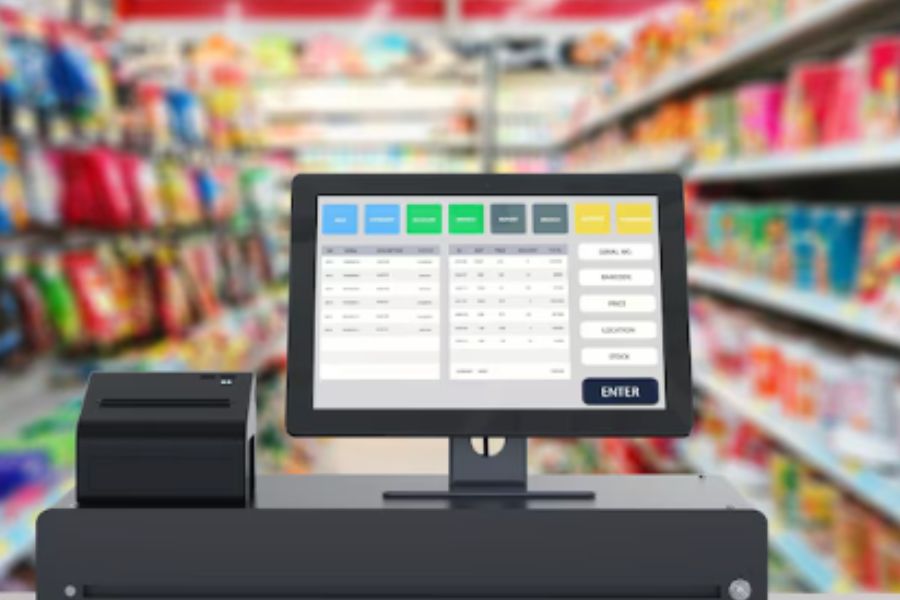Managing logistics efficiently is one of the most challenging aspects of running a retail business. A Point of Sale (POS) system that integrates logistics simplifies the process in offering real-time visibility into both stock and sales. With accurate data at your fingertips, you can avoid out-of-stock situations and prevent manual errors that disrupt business operations. In this article, we’ll break down how a POS system connected to logistics can simplify operations, reduce bottlenecks, and improve overall performance.
Highlights:
- A POS system bridges the gap between sales and logistics by providing real-time inventory visibility and automating stock updates, providing smoother coordination across warehousing and distribution.
- Automated stock tracking, order fulfillment, and integration with supply chain systems – these functions are required for improving accuracy and efficiency in logistics workflows.
What Is the Role of a Point of Sale System in Logistics?
The global logistics market, valued at USD 3.79 trillion in 2023, is on a steady upward trajectory. As logistics continues to shape global trade, businesses must find ways to keep their operations efficient and responsive.
A POS system integrated with logistics bridges the gap between sales and the movement of goods. Thanks to the system, retailers can monitor sales as they happen, providing a clear view of inventory and managing stock effectively.
When sales data and logistics work together, reordering becomes more precise, and goods move through the supply chain with fewer disruptions. The result? Stock stays aligned with demand, reducing the risk of shortages or excess. This system also gives businesses better insight into how goods flow, supporting informed decisions that keep operations running smoothly.
Critical Functions of POS Systems in Logistics
POS systems play a pivotal role in logistics, providing vital functions that simplify operations, improve accuracy, and elevate overall supply chain performance.
- Inventory Management: Point of sale logistics systems offer real-time monitoring of inventory levels. This functionality facilitates meticulous inventory control, effectively mitigating risks associated with stock shortages and overstocking. Accurate inventory records are maintained through automated updates, ensuring optimal stock levels.
- Order Processing: These systems execute end-to-end order management, encompassing order placement, tracking, and fulfillment. Automation in this sequence ensures that customer orders are processed with precision and speed, thereby enhancing operational efficiency and customer satisfaction.
- Warehouse Management: Interfacing point of sale (POS) systems with warehouse management systems (WMS) allows for seamless synchronization of logistical operations within the warehouse. This integration facilitates the systematic organization, storage, and retrieval of goods, significantly improving spatial efficiency while enhancing the overall throughput of warehousing operations.
- Supply Chain Visibility: POS systems grant comprehensive visibility across the entire supply chain network, from suppliers to end customers. This transparency allows businesses to monitor the transit of goods, identify logistical bottlenecks, and execute data-driven decisions to optimize operational workflows and supply chain efficacy.
- Sales Reporting and Analytics: POS systems generate exhaustive sales reports and analytics, providing granular insights into sales patterns, customer behavior, and overall business performance metrics. These insights empower businesses to conduct sophisticated data analysis, facilitating strategic planning and informed decision-making to drive profitability and operational excellence.
POS systems are vital for logistics operations, supporting accuracy, coordination, and overall performance across various stages of the supply chain.
Benefits of Integrating Point of Sale In A Logistics System
Real-Time Inventory Visibility and Coordination
A POS system provides immediate updates on stock levels across warehouses and distribution centers. Each transaction or stock movement is recorded automatically, which reduces the need for manual tracking. As a result, discrepancies between actual and recorded stock are minimized, making it easier to coordinate activities between sales, storage, and delivery.
Moreover, real-time tracking helps logistics teams maintain better control over stock levels, avoiding both overstocking and unexpected shortages. This visibility allows for more effective stock rotation, especially for items with limited shelf life or seasonal demand. By having this level of transparency, businesses can avoid the delays and bottlenecks that often disrupt logistics workflows.
Greater Accuracy and Speed in Order Fulfillment
When a POS system is integrated into logistics, it automates key processes like order entry, stock picking, and shipment preparation. This automation significantly reduces human error, ensuring that the right items are selected and packed accurately for shipment.
Furthermore, with automated packing lists and shipping labels, the time between order placement and dispatch is reduced. This not only accelerates the overall fulfillment process but also improves reliability, reducing the likelihood of delays or incorrect shipments. As a result, logistics teams can handle orders more efficiently, leading to a smoother customer experience.
Actionable Data Insights for Supply Chain Adjustments
POS systems generate useful data on sales trends, stock movement, and supplier performance. With this information, logistics teams can make more informed decisions about stock levels and procurement cycles. For example, by analyzing historical data, businesses can better anticipate demand, leading to smarter inventory planning.
In addition, the data helps identify inefficiencies within the supply chain, such as delays from specific suppliers or recurring issues in shipping. This allows logistics managers to adjust schedules or renegotiate supplier terms, ensuring better alignment with operational needs. By regularly reviewing stock turnover rates, businesses can also refine their product offerings, reducing unnecessary inventory and increasing profitability.
Flexibility in Growing Logistics Operations
As a business expands, managing logistics becomes more complex. POS systems support this growth by providing tools that can handle larger stock volumes and more intricate distribution networks. With features like real-time tracking and flexible stock management, businesses can adapt to rising demands without compromising performance.
Furthermore, POS systems can integrate seamlessly with other business systems, such as customer relationship management (CRM) or enterprise resource planning (ERP) platforms. This integration allows for better coordination across departments, which is particularly important when scaling logistics operations. As new markets, suppliers, or distribution centers are added, businesses can adjust their logistics processes accordingly without disrupting day-to-day operations.
ConnectPOS – Right POS System For Your Logistics Operation
ConnectPOS is a smart solution for businesses that need to manage inventory, sales, and daily operations more effectively. It connects different parts of your business through real-time data, allowing you to monitor stock levels, adjust orders based on actual demand, and keep a clear view of product movement.
The system integrates smoothly across multiple sales channels, ensuring that every transaction updates inventory and orders immediately. This helps avoid overstocking or running low on important items. Its detailed reporting tools give insights into sales trends and product performance, helping businesses make informed decisions.
Beyond sales and inventory, ConnectPOS adapts to various business needs with its compatibility across devices and platforms. Whether managing one store or several locations, the system adjusts to your business environment and scales as your needs grow.
For businesses that handle logistics, the constant data flow supports better inventory control and supplier coordination. This up-to-date information allows teams to respond quickly to changes in demand and manage stock efficiently.
FAQs: Point of Sale Logistics
- Is a POS system suitable for complex logistics operations?
Yes, POS systems can handle complex logistics setups by integrating with multiple sales channels and warehouses, providing a unified view of stock levels and orders across locations. - Can a point of sale logistics help improve supplier relationships?
A POS system helps maintain better communication with suppliers in providing accurate inventory data. Suppliers can adjust production or delivery schedules based on real-time demand, leading to more efficient collaboration. - What devices are compatible with POS systems for logistics?
POS systems are typically compatible with a range of devices, including desktop computers, tablets, mobile devices, and specialized POS hardware like barcode scanners and receipt printers. - Do POS systems support multi-location businesses?
Yes, most modern POS systems are designed to manage inventory and sales across multiple locations, providing a centralized platform to monitor stock and order status in real time.
Conclusion
The integration of point of sale logistics marks an important step forward for retail and business operations. As discussed, the benefits of adopting this system in logistics are vast, from real-time inventory tracking and improved customer service to more effective inventory control and data-driven decision-making—all contributing to cost savings and increased profitability.
When choosing ConnectPOS, businesses can stay ahead in the competitive retail landscape, ready to face challenges and seize new opportunities in this dynamic environment. Contact us now!



